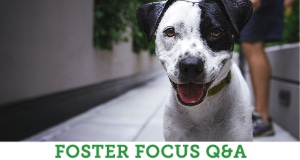
Enrichment for Your Pets and Ours
May 17, 2020
Protect Your Pets This Summer
July 1, 2020Our focus for 2020 is on foster families – little did we know when we set a goal to grow our foster program that we’d end up with 100% of our animals in foster care! We are so grateful to the many families in Northeastern Oklahoma who opened their hearts and homes to our dogs and cats. As of today, we have 61 animals in foster care and we sent 112 pets to their forever homes since we got closed to the public on March 19.
Fostering a dog is fun and rewarding for many reasons, but we know you have lots of questions. Here are some questions we’ve gotten from foster parents with answers from our Training and Assessment Manager Angela Rodriguez.

Hannah was rescued by the Tulsa SPCA on March 10. She’s currently in foster care learning lots, but she would love to find her forever home. Please consider adopting Hannah or any of our dogs or cats. Learn more at tulsaspca.org/how-to-adopt.
Q: My foster dog seems to have limitless energy, how can I get her to settle down?
Doing nothing is hard for most dogs! So we should show them we like it when they relax and rest by calmly dropping a treat between their paws when they are naturally doing so. We can help them find more periods of rest by making sure they get plenty of exercise and enrichment. We recommend a mix of exciting activities like fetch, tug, play with other dogs (if safe and appropriate) and training, as well as activities that decrease their overall arousal like enrichment, decompression walks and having plenty of safe things to chew on.
Q: I heard it’s best to crate (or confine my foster dog to a doggie-proofed area) when I’m not at home. How do I teach him to enjoy being in a crate?
We recommend that all dogs are taught to love their crates. This sets them up for success in future homes and can prevent unwanted destructive behavior while you’re not watching them! Follow this link for some crate training basics. Crates can be boring spaces even once a dog is trained, so don’t forget to give them something safe and tasty to enjoy while they’re in it, like a frozen stuffed Kong!
Q: I have carpet. My foster dog isn’t housetrained yet. What do I do?
An ounce of prevention is worth a pound of cure! Potty training gets harder and harder as a dog has more and more accidents in the house, so we recommend keeping eyes on them at all times until they have a good habit developed of using the bathroom outside. The best way to build the habit quickly is by going outside with them and rewarding them lavishly when they do their business. Click here for more tips and tricks.
Q: My foster dog seems to be really protective of his meal and bones. He eats very fast, becomes still when I pass by while he’s eating, and he growled at me once when I tried to take his rawhide chew. What should I do?
While resource guarding is a very normal canine behavior, we can still manage the situation to keep everyone safe. We recommend feeding your foster dog separately from other animals and children, and not disturbing them when they are enjoying a meal or special treat. If you notice resource-guarding behavior, don’t punish it, as that will only make matters worse. Instead please consult a professional trainer for help implementing a safe behavior modification program.
Q: I’d like to train my foster dog to come, sit and lay down. What do you recommend?
We recommend positive reinforcement training, which means rewarding dogs for their work, usually by using food. While some dogs find play, petting from loved ones and access to the environment reinforcing, all dogs find food reinforcing, so please use treats to teach these skills by first luring the dog into the correct position and then feeding the treat while they are in that position. A reliable recall is a great behavior to teach as it’s handy and can also help keep a dog safe! Follow this link for fantastic instruction and how to avoid common training errors!
Q: My foster dog only does the obedience cues I taught him when I have a treat in my hand? Why won’t he just do what I say?
In the same way that you like to be paid for the hours you put in at your job, dogs deserve to be paid for their work too. Sometimes we inadvertently teach dogs that they only get paid when they see the treat present, by not paying them often even when they do what we ask. This can also happen when we’ve use a food lure for too long when teaching a skill. For tips on fading the lure, follow this link!
Disclaimer: We employ a professional dog trainer, but neither she nor Tulsa SPCA is your dog trainer. The information in this article is for general informational purposes only and is not specific professional advice. This article does not create a client relationship. The Tulsa SPCA is not liable for any losses or damages related to actions of failure to act related to the content in this article. If you need specific advice, consult with a local behavioral professional who specializes in your specific problem area.


